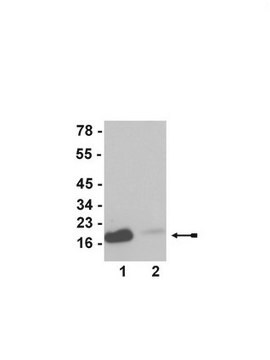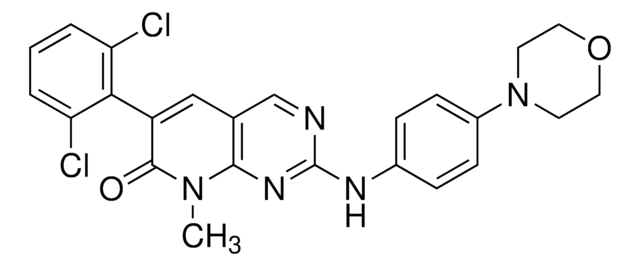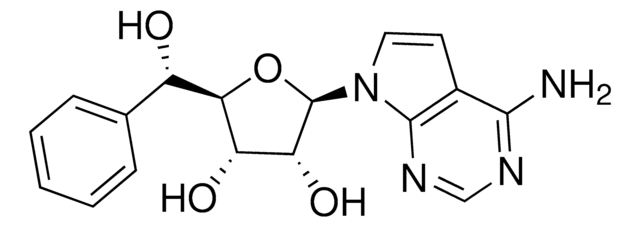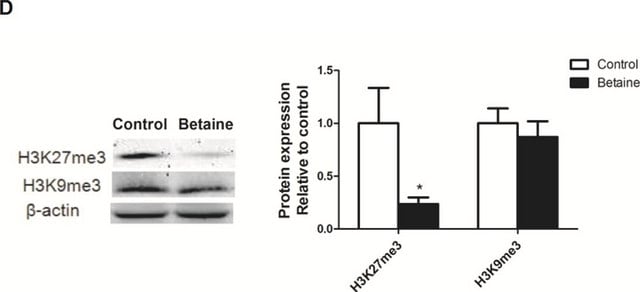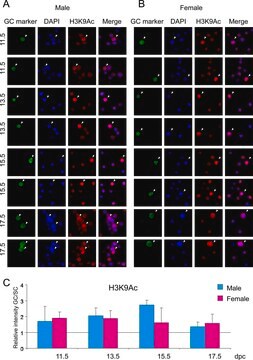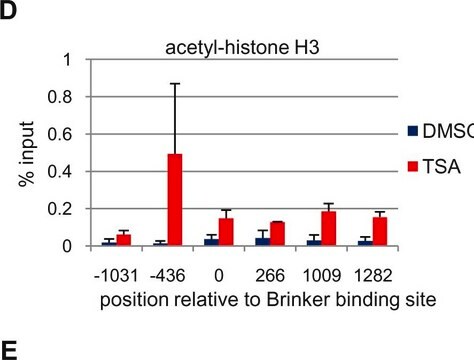17-10112
ChIPAb+ Acetyl Histone H3 (Lys23) - ChIP Validated Antibody and Primer Set
serum, from rabbit
Synonim(y):
H3K23Ac, Histone H3 (acetyl K23)
Zaloguj sięWyświetlanie cen organizacyjnych i kontraktowych
About This Item
Kod UNSPSC:
12352203
eCl@ss:
32160702
NACRES:
NA.52
Polecane produkty
pochodzenie biologiczne
rabbit
Poziom jakości
forma przeciwciała
serum
klon
polyclonal
reaktywność gatunkowa
Saccharomyces cerevisiae, human, yeast
reaktywność gatunkowa (przewidywana na podstawie homologii)
vertebrates (most common)
producent / nazwa handlowa
ChIPAb+
Upstate®
metody
ChIP: suitable
immunoprecipitation (IP): suitable
western blot: suitable
numer dostępu NCBI
numer dostępu UniProt
Warunki transportu
dry ice
Powiązane kategorie
Opis ogólny
All ChIPAb+ antibodies are individually validated for chromatin precipitation, every lot, every time. Each ChIPAb+ antibody set includes control primers (tested every lot by qPCR) to biologically validate your IP results in a locus-specific context. The qPCR protocol and primer sequences are provided, allowing researchers to validate ChIP protocols when using our antibody in their chromatin context. Each set also includes a negative control antibody to ensure specificity of the ChIP reaction.
The ChIPAb+ Acetyl Histone H3 (Lys23) set includes the Acetyl Histone H3 (Lys23) antibody, a normal rabbit serum, and control primers which amplify a 166 bp region of human GAPDH promoter. The Acetyl Histone H3 (Lys23) and negative controls are supplied in a scalable "per ChIP" reaction size and can be used to functionally validate the precipitation of Acetyl Histone H3 (Lys23)-associated chromatin.
The ChIPAb+ Acetyl Histone H3 (Lys23) set includes the Acetyl Histone H3 (Lys23) antibody, a normal rabbit serum, and control primers which amplify a 166 bp region of human GAPDH promoter. The Acetyl Histone H3 (Lys23) and negative controls are supplied in a scalable "per ChIP" reaction size and can be used to functionally validate the precipitation of Acetyl Histone H3 (Lys23)-associated chromatin.
Histone H3 is one of the five main histone proteins involved in the structure of chromatin in eukaryotic cells. Featuring a main globular domain and a long N-terminal tail, H3 is involved with the structure of the nucleosomes of the ′beads on a string′ structure.
The N-terminal tail of histone H3 protrudes from the globular nucleosome core and can undergo several different types of epigenetic modifications that influence cellular processes. These modifications include the covalent attachment of methyl or acetyl groups to lysine and arginine amino acids and the phosphorylation of serine or threonine.
The N-terminal tail of histone H3 protrudes from the globular nucleosome core and can undergo several different types of epigenetic modifications that influence cellular processes. These modifications include the covalent attachment of methyl or acetyl groups to lysine and arginine amino acids and the phosphorylation of serine or threonine.
Specyficzność
Histone H3 acetylated on lysine 23. Does not recognize unacetylated recombinant histone H3
Immunogen
Ovalbumin-conjugated, synthetic peptide (KQLASAcKAARK-C) corresponding to amino acids 18-27 of yeast histone H3 acetylated on lysine 23 with a C-terminal cysteine added for conjugation purposes
Zastosowanie
Chromatin Immunoprecipitation:
Representative lot data.
Sonicated chromatin prepared from HeLa cells (1 X 10E6 cell equivalents per IP) were subjected to chromatin immunoprecipitation using 2 µL of either normal rabbit serum or 2 µL Anti-acetyl-Histone H3 (Lys23)and the Magna ChIP® A Kit (Cat. # 17-610). Successful immunoprecipitation of acetyl-Histone H3 (Lys23) associated DNA fragments were verified by qPCR using Control Primers specific for the human GAPDH promoter region as a positive locus, and MyoD primers as a negative locus. Data is presented as percent input of each IP sample relative to input chromatin for each amplicon and ChIP sample as indicated.
Please refer to the EZ-Magna ChIP A (Cat. # 17-408) or EZ-ChIP (Cat. # 17-371) protocol for experimental details.
Western Blot Analysis:
Representative lot data.
Acid extracts from sodium butyrate treated HeLa cells (Lane 1, Catalog # 17-305) and recombinant Histone H3 (Lane 2, Catalog # 14-494) were probed with Anti-acetyl-Histone H3 (Lys23) (1:100,000 dilution).
Arrow indicates acetyl histone H3 (~17 kDa)
Dot Blot:
Representative lot data.
40 ng and 4ng amounts of histone peptides with various modifications (see table 1) were transferred to PVDF membrane and probed with Anti-Acetyl-Histone H3 (Lys23) antibody (1:2000 dilution). Proteins were visualized using a goat anti-rabbit IgG conjugated to HRP and a chemiluminescence detection system. Image from a 60 second exposure is shown.
Representative lot data.
Sonicated chromatin prepared from HeLa cells (1 X 10E6 cell equivalents per IP) were subjected to chromatin immunoprecipitation using 2 µL of either normal rabbit serum or 2 µL Anti-acetyl-Histone H3 (Lys23)and the Magna ChIP® A Kit (Cat. # 17-610). Successful immunoprecipitation of acetyl-Histone H3 (Lys23) associated DNA fragments were verified by qPCR using Control Primers specific for the human GAPDH promoter region as a positive locus, and MyoD primers as a negative locus. Data is presented as percent input of each IP sample relative to input chromatin for each amplicon and ChIP sample as indicated.
Please refer to the EZ-Magna ChIP A (Cat. # 17-408) or EZ-ChIP (Cat. # 17-371) protocol for experimental details.
Western Blot Analysis:
Representative lot data.
Acid extracts from sodium butyrate treated HeLa cells (Lane 1, Catalog # 17-305) and recombinant Histone H3 (Lane 2, Catalog # 14-494) were probed with Anti-acetyl-Histone H3 (Lys23) (1:100,000 dilution).
Arrow indicates acetyl histone H3 (~17 kDa)
Dot Blot:
Representative lot data.
40 ng and 4ng amounts of histone peptides with various modifications (see table 1) were transferred to PVDF membrane and probed with Anti-Acetyl-Histone H3 (Lys23) antibody (1:2000 dilution). Proteins were visualized using a goat anti-rabbit IgG conjugated to HRP and a chemiluminescence detection system. Image from a 60 second exposure is shown.
Research Category
Epigenetics & Nuclear Function
Epigenetics & Nuclear Function
This ChIPAb+ Acetyl Histone H3 (Lys23) -ChIP Validated Antibody & Primer Set conveniently includes the antibody & the specific control PCR primers.
Opakowanie
25 assays per set. Recommended use: ~2 μL of antibody per chromatin immunoprecipitation (dependent upon biological context).
Jakość
Chromatin Immunoprecipitation:
Representative lot data.
Sonicated chromatin prepared from HeLa cells (1 X 10E6 cell equivalents per IP) were subjected to chromatin immunoprecipitation using 2 µL of either normal rabbit serum, or 2 µL Anti-acetyl-Histone H3 (Lys23) and the Magna ChIP® A Kit (Cat. # 17-610). Successful immunoprecipitation of acetyl-Histone H3 (Lys23) associated DNA fragments was verified by qPCR using Control Primers specific for the human GAPDH promoter region
Please refer to the EZ-Magna ChIP A (Cat. # 17-408) or EZ-ChIP (Cat. # 17-371) protocol for experimental details.
Representative lot data.
Sonicated chromatin prepared from HeLa cells (1 X 10E6 cell equivalents per IP) were subjected to chromatin immunoprecipitation using 2 µL of either normal rabbit serum, or 2 µL Anti-acetyl-Histone H3 (Lys23) and the Magna ChIP® A Kit (Cat. # 17-610). Successful immunoprecipitation of acetyl-Histone H3 (Lys23) associated DNA fragments was verified by qPCR using Control Primers specific for the human GAPDH promoter region
Please refer to the EZ-Magna ChIP A (Cat. # 17-408) or EZ-ChIP (Cat. # 17-371) protocol for experimental details.
Opis wartości docelowych
17kDa
Postać fizyczna
Anti-Acetyl Histone H3 (Lys23) (rabbit polyclonal). One vial of 50 µL of rabbit serum containing 0.05% sodium azide and 30% glycerol. Store at -20°C.
Normal Rabbit Serum. One vial of 100 μL of antiserum containing 0.05% sodium azide. Store at -20°C.
Control Primers, human GAPDH promoter. One vial containing 75 μL of 5 μM each of primer specific for human GAPDH promoter. Store at -20°C.
FOR: TAC TAG CGG TTT TAC GGG CG
REV: TCG AAC AGG AGG AGC AGA GAG CGA
Normal Rabbit Serum. One vial of 100 μL of antiserum containing 0.05% sodium azide. Store at -20°C.
Control Primers, human GAPDH promoter. One vial containing 75 μL of 5 μM each of primer specific for human GAPDH promoter. Store at -20°C.
FOR: TAC TAG CGG TTT TAC GGG CG
REV: TCG AAC AGG AGG AGC AGA GAG CGA
Przechowywanie i stabilność
Stable for 1 year at -20°C from date of receipt. Handling Recommendations: Upon first thaw, and prior to removing the cap, centrifuge the vial and gently mix the solution. Aliquot into microcentrifuge tubes and store at -20°C. Avoid repeated freeze/thaw cycles, which may damage IgG and affect product performance.
Note: Variability in freezer temperatures below -20°C may cause glycerol containing solutions to become frozen during storage.
Note: Variability in freezer temperatures below -20°C may cause glycerol containing solutions to become frozen during storage.
Komentarz do analizy
Control
Includes normal rabbit serum and primers specific for human GAPDH promoter.
Includes normal rabbit serum and primers specific for human GAPDH promoter.
Informacje prawne
MAGNA CHIP is a registered trademark of Merck KGaA, Darmstadt, Germany
UPSTATE is a registered trademark of Merck KGaA, Darmstadt, Germany
Oświadczenie o zrzeczeniu się odpowiedzialności
Unless otherwise stated in our catalog or other company documentation accompanying the product(s), our products are intended for research use only and are not to be used for any other purpose, which includes but is not limited to, unauthorized commercial uses, in vitro diagnostic uses, ex vivo or in vivo therapeutic uses or any type of consumption or application to humans or animals.
Ta strona może zawierać tekst przetłumaczony maszynowo.
Kod klasy składowania
10 - Combustible liquids
Certyfikaty analizy (CoA)
Poszukaj Certyfikaty analizy (CoA), wpisując numer partii/serii produktów. Numery serii i partii można znaleźć na etykiecie produktu po słowach „seria” lub „partia”.
Masz już ten produkt?
Dokumenty związane z niedawno zakupionymi produktami zostały zamieszczone w Bibliotece dokumentów.
Jeong-Hwan Yoon et al.
Nature communications, 6, 7600-7600 (2015-07-22)
Transforming growth factor-β (TGF-β) and interleukin-6 (IL-6) are the pivotal cytokines to induce IL-17-producing CD4(+) T helper cells (TH17); yet their signalling network remains largely unknown. Here we show that the highly homologous TGF-β receptor-regulated Smads (R-Smads): Smad2 and Smad3
Nasz zespół naukowców ma doświadczenie we wszystkich obszarach badań, w tym w naukach przyrodniczych, materiałoznawstwie, syntezie chemicznej, chromatografii, analityce i wielu innych dziedzinach.
Skontaktuj się z zespołem ds. pomocy technicznej